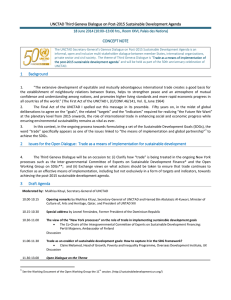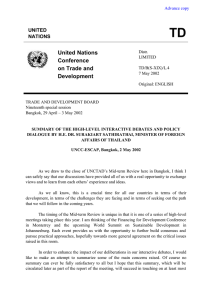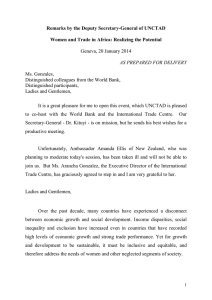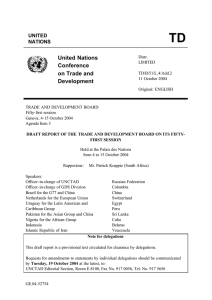TD United Nations Conference on Trade and
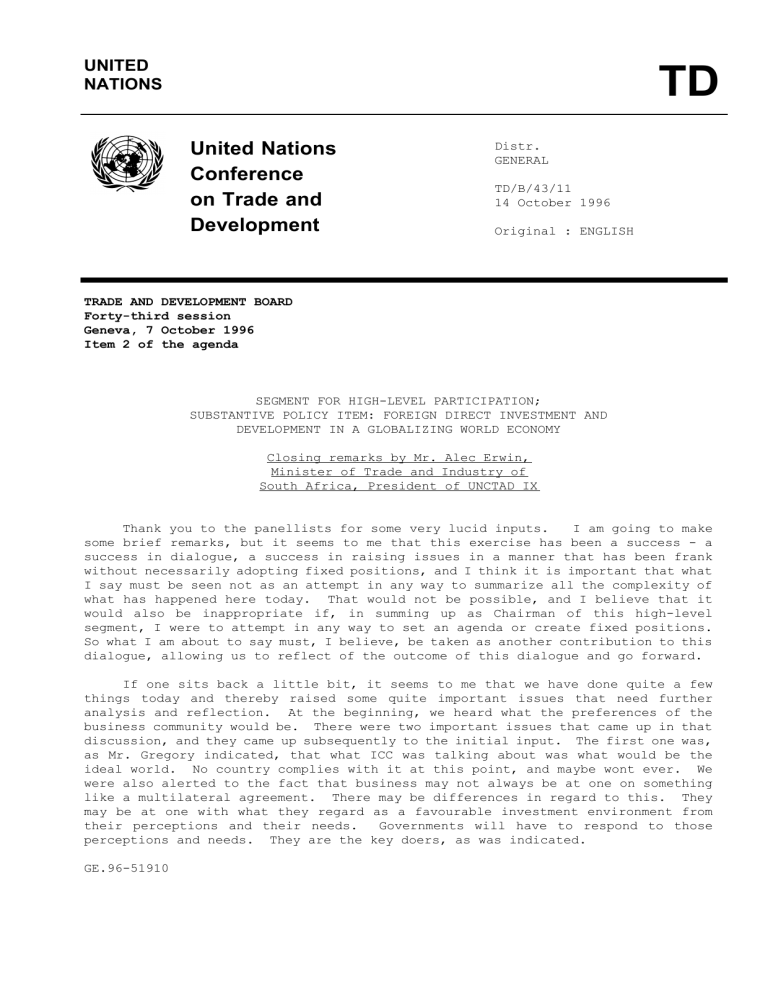
UNITED
NATIONS
United Nations
Conference on Trade and
Development
Distr.
GENERAL
TD/B/43/11
14 October 1996
Original : ENGLISH
TD
TRADE AND DEVELOPMENT BOARD
Forty-third session
Geneva, 7 October 1996
Item 2 of the agenda
SEGMENT FOR HIGH-LEVEL PARTICIPATION;
SUBSTANTIVE POLICY ITEM: FOREIGN DIRECT INVESTMENT AND
DEVELOPMENT IN A GLOBALIZING WORLD ECONOMY
Closing remarks by Mr. Alec Erwin,
Minister of Trade and Industry of
South Africa, President of UNCTAD IX
Thank you to the panellists for some very lucid inputs. I am going to make some brief remarks, but it seems to me that this exercise has been a success - a success in dialogue, a success in raising issues in a manner that has been frank without necessarily adopting fixed positions, and I think it is important that what
I say must be seen not as an attempt in any way to summarize all the complexity of what has happened here today. That would not be possible, and I believe that it would also be inappropriate if, in summing up as Chairman of this high-level segment, I were to attempt in any way to set an agenda or create fixed positions.
So what I am about to say must, I believe, be taken as another contribution to this dialogue, allowing us to reflect of the outcome of this dialogue and go forward.
If one sits back a little bit, it seems to me that we have done quite a few things today and thereby raised some quite important issues that need further analysis and reflection. At the beginning, we heard what the preferences of the business community would be. There were two important issues that came up in that discussion, and they came up subsequently to the initial input. The first one was, as Mr. Gregory indicated, that what ICC was talking about was what would be the ideal world. No country complies with it at this point, and maybe wont ever. We were also alerted to the fact that business may not always be at one on something like a multilateral agreement. There may be differences in regard to this. They may be at one with what they regard as a favourable investment environment from their perceptions and their needs. Governments will have to respond to those perceptions and needs. They are the key doers, as was indicated.
GE.96-51910
TD/B/43/11 page 2
I think we have heard the reservations, the viewpoints, the comments of many
Governments, particularly on what the implications would be for them of a multilateral agreement. I am pleased to say that it was one of my compatriots from
Africa who probably put this with the greatest vigour, but these are reservations and we will have to respect them in the dialogue that goes forward. We have heard,
I think, well-stated argument and against the question of whether a MIA should come now or whether we should allow for an organic development of this, emerging out of many of the existing agreements and obviously taking into account the critical position that an OECD MIA would occupy when they reach agreement on it. It does seem to me that one point that began to emerge in the closing two panels, and particularly the last one, though it came up on a number of occasions, was that when regions begin to discuss investment agreements, they do it at the same time as they are discussing a number of other issues. This came up under the MERCOSUR presentation. I know it is very true of our own discussions in SADEC in Southern
Africa. In a region where you have got contiguous boundaries and cross-border flows, you can't really discuss investment in the absence of a wide range of other issues - population movements, joint infrastructural projects, etc. So it seems inevitable that there would be qualitative differences between the breadth, intensity and detail of the discussions within a regional grouping and the broader multilateral arrangements that could emerge over time. I don't think this was highlighted sufficiently, because it does indicate an inevitable situation where, even if we were to get a multilateral agreement, regions may still be going beyond that MIA in the kind of dynamic situation that was outlined right at the beginning.
I think what many participants highlighted in one or another way - and
Ambassador Rossier did this again very lucidly at the end - was that this process that we are now discussing concerning the need for a multilateral agreement or the reason that it is on the agenda (there may be those who feel there is no need at this stage, but it is on the agenda) doesn't just come from nowhere. It comes from a series of processes, and I think we can all remind ourselves in UNCTAD of the very detailed discussions that were held in Midrand about the underlying economic processes that are giving rise to globalization - the changes in investment and capital flows and the instantaneous nature of knowledge and information around the world that underly globalization. A point was made by the moderator in the first section that it may well be that, if you look at the absolute numbers, relatively speaking in regard to investment flows we may have had as much movement a hundred years ago, but I think that what is indisputable is that the effects and the underlying impetus for this FDI has changed structurally and significantly. In our discussions on trade in UNCTAD in particular and in the discussions on investment here today, this emerges again. We really do have to get to grips with the more deep-seated economic changes that are integrating economic space, as Mr. Ricupero said in UNCTAD IX, because it immediately means that wider issues are at stake. Mr.
Graham and many other speakers in this conference have highlighted this issue.
There is a holistic approach that is needed in these discussions. This raises a point which many speakers pointed to as an area that needed more detailed analysis, that is in the mobilization of resources for investment, be they domestic resources or be they FDI for any particular economy, are we in a position as countries managing our own economy to draw a distinction between domestic investment and foreign? I know, speaking for South Africa, we feel that it is not possible for your domestic investors to be governed by one set of economic forces and your foreign investors to be governed by another.
TD/B/43/11 page 3
We must remind ourselves of an important point made here about the absolute size of FDI. If I remember the figure accurately, Professor Lall made the point that FDI movements constitutes some 5% of total savings. So the resource mobilization process is a gigantic one. I would like to submit that, for all of us attempting to mobilize our own domestic resources, we can't actually avoid or ignore the changes in the production processes, the changes in technology, the changes in marketing, the changes that arise out of mobility, when we consider our own resources, and this means possibly that the overall macroeconomic approach we take in mobilizing resources, the environment we create, can't really be separated out from what is happening in the process of globalization.
But, as in UNCTAD IX in Midrand, time and time again we came back to the issue of the diversity and differential impacts that globalization would have. This point was made again very very strongly by the representative of China. The challenge,
I believe, that faces us is how do we accommodate the differential impacts and the diversity without then talking past each other. This dialogue can try and avoid the danger where the immense diversity of our economic situations causes us to talk past each other because we have different immediate concerns.
A point that was stressed both at UNCTAD IX and here again, but I would like to stress it very strongly as a developing country grappling with this problem, is the need for the enhanced cooperation of the multilateral institutions. It cannot make sense to have different dialogues in different structures and different studies in different structures. At the very least, and it is essential, I believe, there has got to be a dialogue on how we work together in analysing these problems and supporting our positions with informed analysis. Speakers have stressed here, and
I believe this was the mandate of UNCTAD IX and it makes just plain common sense, that not only must UNCTAD undertake the analytical task but it must do what the
Secretary-General has outlined and make every effort to do it in cooperation with other multilateral organizations.
Delegates, I think you can congratulate yourselves for having participated in this conference in a manner that has truly made it a success. I think congratulations should go to UNCTAD and the Secretary-General and Mr. Sauvant and his team and others in UNCTAD for experimenting once again in having a dialogue that avoids some of the pitfalls inherent in the more structured meetings that are necessary in international diplomacy and allows us here to be fairly open and frank.
Whatever happens, this dialogue must continue. We can reflect as we walk towards
Singapore, but let us also bear in mind that, as we saw in UNCTAD IX, even when you have an agreement, as you had in the Uruguay Round, the implementation of that agreement is as important, if not more important, than the signing of the agreement.
In implementing these agreements, a dialogue is fundamental. An agreement that is imposed without support is an agreement bound for failure, bound for a polarisation of our economies and our societies.
Thank you for the privilege of allowing me to chair this segment. Thank you for allowing me to abuse the privilege of being chair and summarizing. This is not a summary that binds you to anything. If it caused you to think, then I have also succeeded. Thank you very much.


